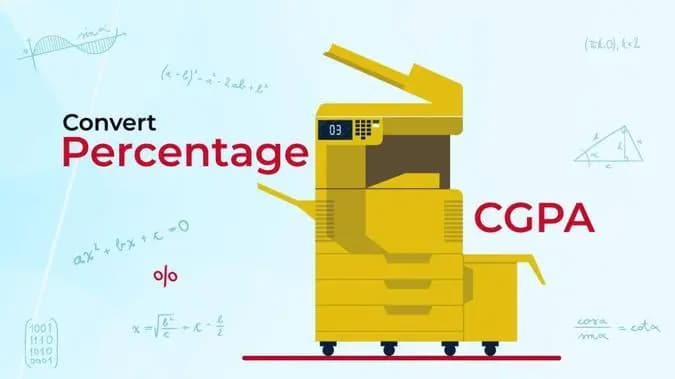Percentage to CGPA Calculator
By Venkatesh NC |
Date 09-08-2024

Table of Contents
- What is Cumulative Grade Point Average (C.G.P.A)
- Understanding the Percentage to CGPA Conversion Process:
- How to Calculate CGPA from Percentage
- How to convert Percentage to C.G.P.A
- Benefits of C.G.P.A to Percentage Calculator
- Mastering the how to find CGPA from percentage:
- FAQs related to Percentage to CGPA Calculator
Admissions Open for
Academic achievement at educational institutions is frequently assessed using various grading schemes, including Cumulative Grade Point Average (CGPA) and Percentage. While a percentage indicates the total number of marks earned in a subject or course, a student's performance can be consistently measured using a CGPA, which is based on grade points. For students and teachers to appropriately evaluate academic achievements and progress, they must know how to convert percentages to CGPAs. We'll go into the specifics of how to convert percentage to CGPA and provide explanations for every stage of the process. By the time it's all over, you'll be able to convert with confidence and know how to calculate CGPA with ease with our percentage to CGPA calculator.
What is Cumulative Grade Point Average (C.G.P.A)
Cumulative Grade Point Average is referred to as CGPA. It is a numerical depiction of a student's total academic achievement during a given time frame, typically a semester or year. Based on a predetermined grading scale, a grade is given for each topic. Following the conversion of these grades into grade points, the CGPA is determined by averaging those grade points.
Understanding the Grading System:
Grade |
Description |
Marks (%) Range |
Grade Point |
| A+ | Excellent | 90-100 | 10 |
| A | Very Good | 80-89 | 9 |
| B+ | Good | 70-79 | 8 |
| B | Above Average | 60-69 | 7 |
| C+ | Average | 50-59 | 6 |
| C | Below Average | 40-49 | 5 |
| D | Pass | 33-39 | 4 |
| F | Fail | Below 33 | 0 |
Understanding the Percentage to CGPA Conversion Process:
Converting percentages into CGPA involves a simple formula:
CGPA = (Percentage Score) / Conversion Factor
Conversion Factor:
This is a crucial element that varies depending on the grading scale used by your institution. Common conversion factors used in India include:
9.5: This is the most commonly used conversion factor, particularly for CBSE schools.
10: Some institutions might utilize a conversion factor of 10.
How to Calculate CGPA from Percentage
By utilizing the conversion formula and considering the additional factors mentioned, you can effortlessly convert your percentage scores to CGPA. Remember, several online resources like calculators, school websites, and mobile apps can simplify the process. Refer our Percentage to CGPA convertor to check your grades easily
How to convert Percentage to C.G.P.A
Conversion Formula:
A methodical approach is required when converting a percentage to a CGPA. Although the procedure could differ slightly based on the grading scheme your school uses, the basic principle stays the same. The following is a detailed guide to help with the conversion:
Step 1: Recognise the Grading System:
Learn about the grading scheme your school uses before moving further. There may be variations in the grading systems used by various educational boards or colleges, each with its own set of grade borders and associated grade points.
Step 2: Give Grade Points to the Range of Percentages
Once you understand the grading scheme, figure out which grade points correlate to which ranges of percentages. Generally, every grade has a predefined grade point and correlates to a particular range of percentages.
Step 3: calculate CGPA:
You must average the grade points earned in all subjects or courses to calculate CGPA from percentage. To do this, add up all of your grade points from each subject, then divide that amount by the total number of subjects.
Example: 
Let's say you scored 85% in your exams.
You need to find your CGPA assuming your school uses a conversion factor of 9.5.
CGPA = 85% / 9.5 = 8.95 (approximately)
Therefore, your CGPA would be approximately 8.95.
Benefits of C.G.P.A to Percentage Calculator
Enhanced accuracy:
The calculator ensures precision in converting your percentage to CGPA. This is particularly valuable when assessing your performance or determining your eligibility for academic programs or scholarships that employ CGPA as the grading scale.
Seamless grading system conversion:
The calculator allows you to convert your percentage into the CGPA format. This is particularly useful when comparing your performance or eligibility for academic programs or scholarships that use CGPA as the grading scale.
Convenient and time-saving:
Using the calculator can obtain a quick and accurate CGPA result with minimal input. This eliminates the need for laborious calculations, saving you time and effort.
User-friendly interface:
The calculator is designed to be user-friendly and requires only basic inputs, typically your overall percentage or individual subject percentages. Its straightforward interface makes it easily accessible to students, teachers, and anyone else needing converting percentages to CGPA.
Educational planning:
A calculator is valuable for students mapping their educational journey. By converting percentages to CGPA, they can gauge their academic performance in relation to specific academic requirements or set targets for future improvement.
Mastering the how to find CGPA from percentage:
Understanding CGPA empowers you to effectively interpret your academic achievements. By utilizing the conversion formula we discussed earlier (CGPA = Percentage / Conversion Factor), you can effortlessly convert your percentage scores to CGPA. Having the ability to convert percentages to CGPA will enable you to monitor your child's academic development and analyse their report card. You can identify their areas of strength and weakness and collaborate to enhance performance by tracking their CGPA over time. Remember to check your school's grading scheme to confirm the conversion factor (commonly 9.5 for CBSE) and the specific grade point values assigned to each letter grade.
FAQs related to Percentage to CGPA Calculator
1. How is C.G.P.A calculated for class 10 CBSE?
In CBSE (Central Board of Secondary Education) for class 10, CGPA is calculated based on the cumulative performance of the student across different subjects. The CGPA is derived by averaging the Grade Points obtained in each subject. The Grade Points are assigned on a scale of 10, ranging from A1 (10 points) to E2 (2 points). The average of these Grade Points is the CGPA, representing the student’s overall performance in class 10.
2. How much C.G.P.A is required for science in CBSE?
The required CGPA for opting for the Science stream in CBSE (Central Board of Secondary Education) may vary across schools. Generally, most schools set a minimum CGPA requirement of 8 or above to pursue Science subjects like Physics, Chemistry, and Biology/Mathematics in class 11. However, it’s important to note that the specific CGPA requirement may differ depending on the school’s policies and admission criteria.
3. How to calculate the percentage from CGPA in graduation?
To convert CGPA (Cumulative Grade Point Average) to a percentage in graduation, you can use the formula: Percentage = CGPA multiplied by 9.5. For example, if a student has a CGPA of 8.2, the equivalent percentage would be 8.2 multiplied by 9.5, resulting in 77.9%. This formula allows students to represent their CGPA scores in the more commonly used percentage format, which is widely understood and accepted by educational institutions and employers.
4. How to calculate the percentage of marks from CGPA in WBUT?
To calculate the percentage of marks from CGPA (Cumulative Grade Point Average) in WBUT (West Bengal University of Technology), you can use the formula: Percentage = CGPA multiplied by 10. For instance, if a student has a CGPA of 8.6, the equivalent percentage would be 8.6 multiplied by 10, resulting in 86%.
5. How does CGPA differ from GPA, and how is it calculated from Percentage?
CGPA considers all your grades across semesters, giving a cumulative average of your performance. GPA is usually for a single term. To calculate CGPA from percentages, divide your percentage score by the conversion factor (often 9.5 for CBSE).
Related Blogs
CGPA To Percentage Calculator: Learn the formula for CGPA to Percentage conversion
Qualities of a Good Student: Mastering all the qualities of a good student requires considerable effort.
Qualities of a Good Student: Get to know about the top 100 animals in English.
Who Discovered Zero?: Without zero, many of today’s technologies would not exist.
Other Related Sections
NCERT Solutions | Sample Papers | CBSE SYLLABUS| Calculators | Converters | Stories For Kids | Poems for kidsCBSE Schools In Popular Cities
- CBSE Schools in Bangalore
- CBSE Schools in Mumbai
- CBSE Schools in Pune
- CBSE Schools in Hyderabad
- CBSE Schools in Chennai
- CBSE Schools in Gurgaon
- CBSE Schools in Kolkata
- CBSE Schools in Indore
- CBSE Schools in Sonipat
- CBSE Schools in Delhi
- CBSE Schools in Rohtak
- CBSE Schools in Bhopal
- CBSE Schools in Aurangabad
- CBSE Schools in Jabalpur
- CBSE Schools in Jaipur
- CBSE Schools in Jodhpur
- CBSE Schools in Nagpur
- CBSE Schools in Ahmednagar
- CBSE School In Tumkur

Call Us to know more about Orchids
Swipe Up

















